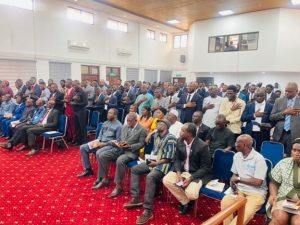
As Ghana’s central bank prepares to submit its proposed cryptocurrency licensing bill to parliament in September 2025, the country faces a defining moment in its financial modernisation journey.
The proposed framework, requiring exchanges and wallet providers to register, meet minimum capital requirements and report suspicious transactions, aims to bring much-needed clarity to a sector that has grown rapidly in recent years.
With over $3 billion in crypto transactions in the last year alone, Ghana has rapidly emerged as a hub for digital asset activity in West Africa.
However, regulating a sector as dynamic as crypto is no easy task. The challenge lies in designing rules that protect users without paralysing innovation.
Done poorly, regulation could lock out local entrepreneurs, discourage foreign investment, and drive the industry underground.
Done right, it could usher in a new era of trust, cross-border collaboration, and digital growth.
To achieve this, Ghana must ensure the bill reflects a nuanced understanding of the ecosystem.
Licensing requirements should account for different types of players from global exchanges with strong compliance infrastructure to emerging Ghanaian platforms just starting out.
Capital thresholds must be proportional, not prohibitive, and compliance costs should not become a barrier to entry for local startups, which form the backbone of the country’s fintech innovation.
There are early signs of industry appetite for cooperation. Global exchanges like Binance have long advocated clearer regulatory guidelines in Africa. In markets like Kenya, the platform actively engaged with lawmakers during the drafting of the Virtual Asset Service Providers Bill, supporting efforts to improve user safety and financial education.
These are examples of how collaborative regulation can unlock shared value if Ghana’s framework encourages, rather than hinders, similar engagement.
Still, concerns linger. Industry stakeholders have raised questions around taxation, license passporting for those already licensed in other jurisdictions, overly punitive penalties, local incentivisation and the potential for overregulation in a market still in its early stages.
Striking the right balance will be key. Larry Cooke, Africa’s Head of Legal at Binance, said, “Ghana is a very mature African economy and its regulators and policy makers understand the need to act swiftly but still safely. It’s very encouraging to have open engagements with all stakeholders to make sure that we drive adoption through education and real-life use cases to ensure Africa is not left behind.”
With so much at stake, Ghana has a unique chance to craft a regulation that doesn’t just catch up to the crypto economy but actively shapes its future.
A collaborative, context-aware approach, one that brings regulators, technologists, civil society, and startups to the table, will be critical.
The question now is whether Ghana will seize this opportunity to lead or let it slip into bureaucratic delay.
BY NII TETTEH QUAYE
The post Crypto regulation in Ghana: Striking the balance between safety, scale appeared first on Ghanaian Times.
Read Full Story












Facebook
Twitter
Pinterest
Instagram
Google+
YouTube
LinkedIn
RSS